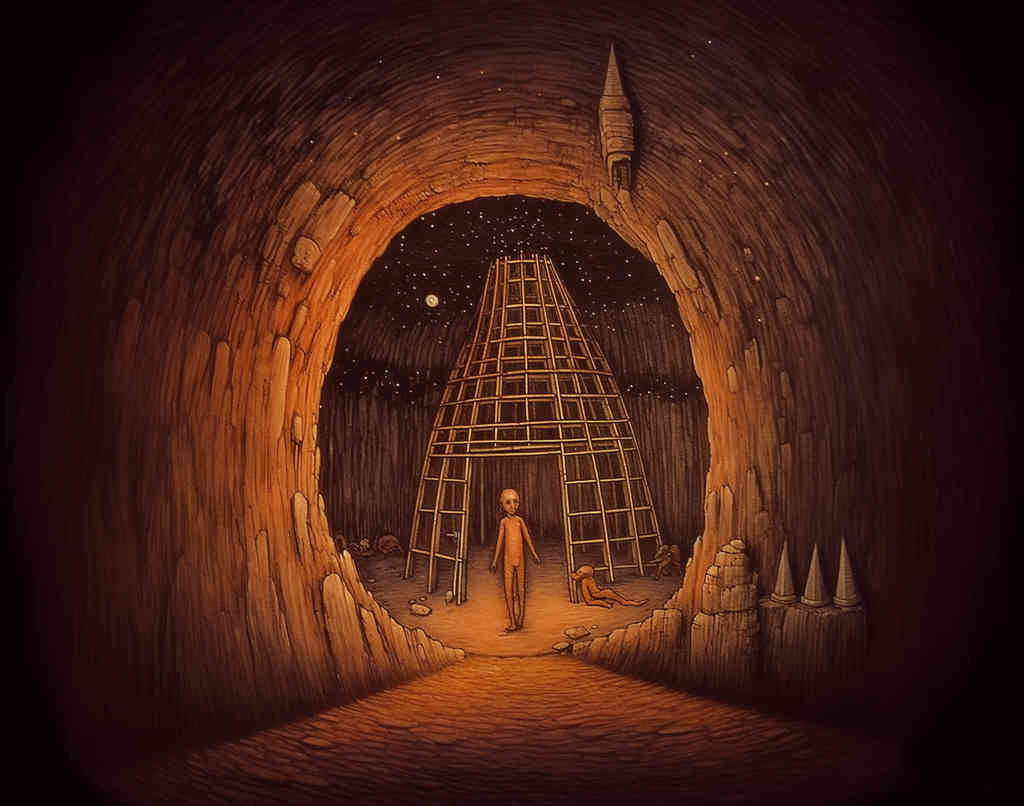The League of Didactic White Boys
Mythcraft in the Age of the Internet

I recently took an ill-advised tour through the scribblings and pamphleteering of my peers and rivals on Substack - the ranks of what I like to call the "League of Didactic White Boys". Many of them probably software engineers, data scientists, the kind of guy with a PhD in economics for no good reason - many of them clearly autodidacts, having spent a good part of their 20's gorging themselves on Wikipedia. They typically have decent historical awareness, a good grasp of the scientific method, a sense of humor - primarily employed to stave off the perpetual depression and occasional waves of despair, varying levels of self-absorption, coupled with a crippling but intermittent awareness of personal insignificance and the improbability of possessing the "correct" answers. As a result, they have developed their intellect into a formidable instrument of filibuster: the deferral of anxiety and moral crisis via philosophical expository, analytic detour, and a shuffling of the cards of concurrent data and historical precedent until a satisfying tarot constellation is reached. They offer this up to you as entertainment, reprieve, enlightenment, hope, refreshment. But I must say I come away from their writing feeling much worse than I began. I feel their displaced anxiety. I feel how trapped they feel: their claustrophobia, their panic, their bitterness, their subdued rage, and above all, their confusion. What a bewildering confused world this 21st century is turning out to be. Go count the number of blogs purporting to explain the madness. - And am I any different? I'd like to think a fresh breeze blows through my words. I'll confess something: if I have a proclivity to any one species of fear, it's claustrophobia. I need the biggest sky possible. I need to feel as close to the stars as to the earth. I need to feel suspended between dust and annihilation in order to feel okay. I need to be reminded of my mortality on a regular basis. I must take risks, I must be outside in the wild with nonhuman creatures, between the unforgiving sun and the relentless squirming life evincing its indifference to my presence or absence. I need to be held at a tenuous distance from the human world to feel sane. Therefore despite our similarities, I don't have a great degree of sympathy for most of the didactic white boys I encounter. I fault them for their lack of courage. They make ideological excursions, they flirt with extremism, they try on various postures, and maybe allow themselves to finally become angry - but how many of them do anything differently with their body in space and time?
Generally I see four solutions to the creeping confusion of 21st century Euroamerican cultural decay, among the educated postliberal:
Those with a background in science flee to statistics. Social science, and thus psychology, and thus the authority on all questions of why people are they way they are, is to be reduced to probability distribution. Again in this I see not much more than an amateur, uninspired, and exhausting form of divination. They shuffle the deck of facts until they get the reading they were looking for, and somewhere in that probability cloud is supposed to be an answer to "yes, but why?"...
Flirtations with extremism. They begin this test: "How conservative can I become in my whiplash, and still respect myself and find justification for my views?" But as the centers of gratification and the dopamine pathways shift, from the good boy who mimics moral posturing as best he can, to the bad boy who delights in provocation, he finds that any degree of conservative extremism may suit him as long as it yields a sense of importance. At least he no longer feels ignored.
Flirtations with religious apocrypha. An initially ironic exploration of early Christian and other Gnostic-Hermetic propaganda begins to become serious, as one acquires a taste for the certainty of the religious worldview. Most of these types were not raised under a religious regime, and thus the narcotic is novel. In fact, the only voice I found in my short survey which remotely reminded me of my own, was an ex-Mormon. He wants to be so "reasonable" and fair - and perhaps still is far too much a good boy. - A lesson to Bartholomy, if he's listening.
An ever-deepening investment in an absurdist, cynical, black humor. Here I have the most sympathy, and here I find the most potential for healing - dangerous as an abiding, unrelenting cynicism can be. It's a poison I'm used to handling as an indispensable ingredient in my kind of health regimen. When I travel in the third world I make a point of smoking the harsh local cigarettes and eating as much spicy food as I can handle, because it makes your skin less appetizing to the ambient mosquitoes. Is our cynicism a pesticide? Are we seeking to become less appetizing to parasitic ideology? Or are we merely seeking a sense of mastery at any cost, no matter how hopeless and desiccated we feel in the aftermath? At least by continually blackening our humor, lowering our expectations of fulfillment, and learning to live without hope, we gain back a sense of control. And truthfully maybe we were much too childish, pampered, and full of hopes to begin with. Maybe we're only discovering the proper orientation of a testosterone-infused mammal a little late in our life - maybe we're making up for being uninitiated boys. Even our pains are esoteric: we feel a crushing sense of responsibility, alongside a bewildering lack of agency. We want to be correct, we want to do it right, we want to lead responsibly and judiciously - all the while we want to unleash our pent up imagination and the funk we've been holding back too long. Finally we stop giving a damn and start saying what we mean: at this point people start paying attention, now that we no longer feel responsible, now that we're willing to go our own way alone. And so it is that every worthy voice in this little club, wanders off into some strange detour from which he'll clearly never return. I feel that I'm witnessing so many potential friends and beautiful enemies disappear over a horizon I have no interest in pursuing.
It's a strange lonely voyeuristic time, this age of the internet. A million peepholes for every decent conversation. A million passive identifications for every participation. Ten million mimicries for every originality. A hundred million nothings for every something. Again I find my healing in the dark - in the "blackout" that waits behind this electrical noise. If I am to wander a wasteland, let it be the wasteland of the stars. Just this moment, Venus is staring at me, chiding, beckoning. She is sexy, I'll admit. Governess of twilight. In her eerie white light I find the willingness to face this inevitable nihilism of a garbage world: I hate the internet for its ugliness, for the way it amplifies the worst of humanity and feeds our petty addictions, for the way it makes our bodies smaller and our minds overwrought - and yet I'm obviously just as dependent on it for communication as anyone else, and like everyone else I've learned to rummage it for trinkets and tools... But please understand me: what you're looking for cannot be found here. Therefore tread lightly my friends, this internet of dismay. If you must seek explanation, seek lightly.
In the morning light, an afterthought:
What are we doing? What compels us to philosophize, synthesize, and mythologize? If we insist that every response to stress is part of the core human adaptive package, then this urge to make sense of a world in the throes of cultural decay must also have its proper function, beyond "just getting by". My answer is clear: we're attempting to create the mythology of a new tribe. Not merely to plug the holes of a leaky lifeboat of personal neurosis - although this may get us started, we quickly find that these consolations serve to rally a following, and we learn to crave the social recognition.
We point to the chaos and confusion and say: "these are the wages of sin", or "thus the age of retribution begins" - look closer at these didactic white boys to see them each groping toward one of these prophetic formulae. But the most ancient, least colored by postaxial evangelical ennui, and thus most restorative and powerful justification of human tumult is: "such is the wheel of fate". Such is all life on this hairy globe. A deep tribal mythology does not merely tell a tall tale of how and why, but addresses what the human creature needs so badly: to rejoin the earthly family, to feel at home here, despite his nightmares of future and past, his feverdreams of utopia and dystopia, his forever disintegrating tribe, the curse of his frail instincts and overwrought cleverness. The point of mythology is to turn cleverness against itself: to use neurotic entanglement to produce feelings of belonging, fulfillment, blessing. To make this overheated expensive cranium do something other than get us into more trouble - the poet's craft largely consists of discovering as many mysterious correspondences as possible, such that an overwhelming subterranean meaningfulness looms, sufficient to swallow whole all nihilistic fatigue. We want to live in a world knitted together by correspondences, like navigating a synaptic carpet, a world of shimmering mirror, a world in which every word speaks of the beginning and the end, in which everything has its place in the sacred circle of time, in which the hoop of life descends and ascends like the ecliptic of the sun, blessing us as the generations pass. That's the ancient vision we long for: that is the grand dream of the old man lodged deep in our ape heart, the one who sits blind in the darkest corner of the cave, smoking and chanting the songs of his fathers, he who makes us weep with the beauty and wisdom of this ape-nature.


